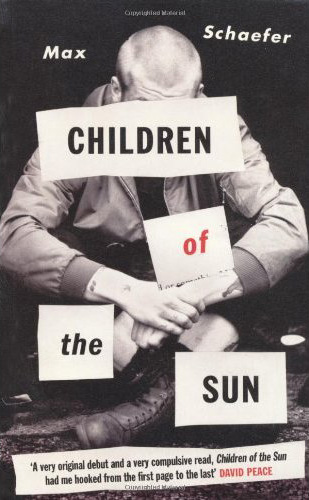Max Schaefer – Children of the Sun (Granta, 2010)
I first read about this book the year before last over at Stewart Home’s blog. My interest was piqued as the subject matter was notorious gay neo-nazi skinhead Nicky Crane, who I’d previously written about here when his appearance in a Psychic TV video came to light. There wasn’t that much material available about Crane online (or anywhere) at the time and I’m still slightly concerned to see my site is the third thing that comes up in a google search for him.
I’ve been meaning to review the book for ages – it was my holiday read last year. This is based on my notes from a while back and what I can remember now.
“Children of the Sun” is fictionalised but accurate – Schaefer has certainly put the necessary research into this and there were no cringeworthy bits that usually crop up with depictions of the far right (from posh plays to The Bill). Various aspects of the British fascism are portrayed accurately but without descent into unnecessary trainspotterish detail. Some brushes with anti-fascists are described in similar ways to how they have been told to me as well.
The heart of the story is the interplay between two protagonists – one a contemporary of Crane’s on the far right, another a young researcher who is obsessed with Crane after his death. Although violence and sex are certainly part of the narrative it’s not a football hoolie book which is hagiographic and uncritical.
There is also a good depiction of the paranoia that an obsessive immersion in this material can induce…
The book is not something to read on the train as lurid news clippings and far right agit prop are reproduced throughout. Crane still exerts a morbid fascination on many from beyond the grave – both on the far right and in aspects of gay subculture. I saw him around on a few occasions whilst studying in central London in the early nineties and can confirm he seemed like someone best avoided. The fact that he was living something of a double life doesn’t really detract from this. Clearly a novel about his life will raise more questions than it answers, but it is a good read and I’d definitely recommend it if you have an interest in this sort of subject matter.

I thought this was a bit crap, to be honest, but then I’d have preferred that the author had junked the modern ‘researcher’ parts of the story (which bogged the whole thing down), or had maybe written it as a straightforward piece of non-fiction. But he’s a writer I guess, and that’s just my opinion. Did you know Nicky Crane put out his own comic fanzine too?
Another enigma on that scene was Mick Furbank (bloke who did the Last Resort’s artwork, the ‘crucified skin’ t-shirts and appeared on ‘United Skins’ with Skrewdriver, TDA, et al). Apparently, he was openly gay and used to do performance art pieces masturbating into DM boots and simulating anal sex with male mannequins. Was featured in Sounds in the early ’80s, so it wasn’t like Ian Stuart / Roi Pearce etc would have been blissfully unaware of his sexuality…
Yeah I can see that – but I’m not sure how much material it would have been possible to include, it’s not like he warrants a full literary biography really.
I guess the blindspot Donaldson had for Crane shows him up as being either spectularly lacking in critical faculties or that the friendship transcended their ridiculous belief system? I dunno. Classic “I hate all ****, but you’re alright” stuff.
I’d go for deliberately overlooked, either for friendship’s sake or because certain people genuinely feared Crane. I’ve also heard / read two separate, second-hand accounts that Stuart was pally with a black skinhead in Kings Cross, but haven’t got any proof – obviously this would send his legions of post-crash fans into full-blown ‘ZOG lies’ mode. Still, I guess a diet of sulphate and booze, mixed with deep-seated mental health issues, was never going to produce the most coherent belief system…it seems that most of the serious splits in those factions (and at the Last Resort shop in Goulston Street) were related to money, and accusations of individuals ripping each other off…
I thought the researcher plot was the stronger, and that the two themes worked well – the researcher one being necessary for an examination of the guilty appeal/obsessive aspect of these kind of things, and also for the way immersion in this stuff can poison people a bit, even if well-intentioned.
The Guardian review said was that it was a bit showy over the amount of research Schaeffer had done (and put this down to it being his first novel). I enjoyed the level of detail, but think the criticism is fair, and it’s the researcher aspect of the book that suffers from slightly mechanical character retelling (a bit like all that shit about church bells in Huysman’s “La Bas”, which Martin also hated).
I was gripped by it, to be honest.
I read it on the train 🙂
And for the most part really enjoyed it.